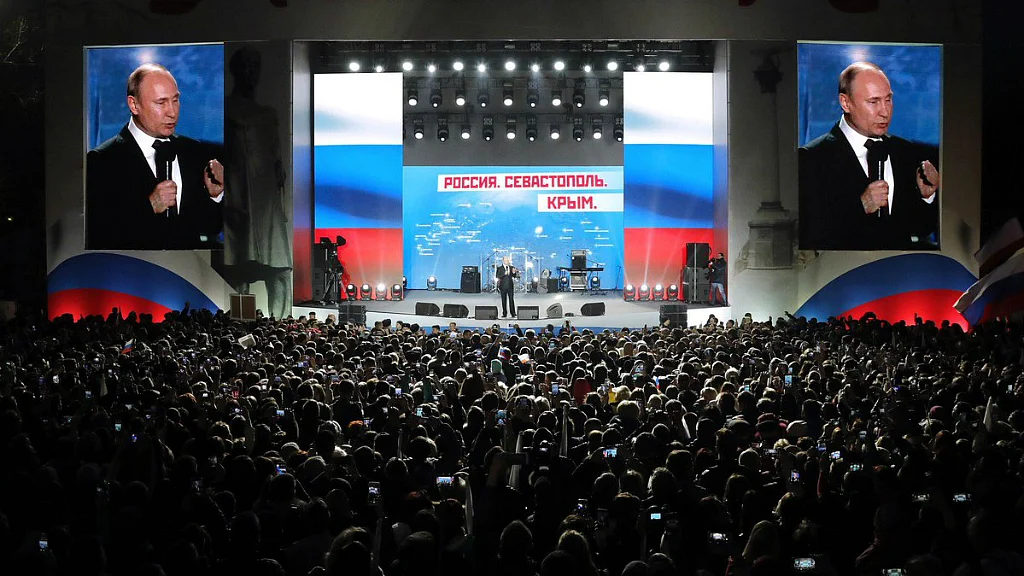Facing global criticism, Putin looks set to win fourth term
Despite a close link between Russia’s foreign adventures and fragile economic condition at home, seventy per cent Russians approve of Vladimir Putin’s policies

“Use your power to choose the future of our great country, Russia, which all of us hold dear," Russia's President Vladimir Putin on Friday appealed to his countrymen in his last address this presidency ahead of the presidential vote on Sunday.
The three-time Russian president is widely expected to win a fourth term. The challenge for him is to win it convincingly, in the absence of a powerful opposition candidate out of the seven who are challenging Putin.
Boris Nemtsov, a charismatic opposition leader and an anti-corruption crusader murdered three years back, was viewed as a credible alternative to Putin. Another politician, Alexei Navalny, has been barred from standing in the election after being convicted of fraud. Critics of Putin blame him for being behind Nemtsov's killing and Navalny's “trumped-up” conviction.
Having said that, Putin enjoys widespread popularity in Russia. Most recent opinion polls pegged his popularity ratings among Russians at 70 per cent.
A 70 per cent vote is what Putin is eyeing to get back to power, because it would mean that Putin’s policies are backed by most Russians.
Putin's campaign slogan- Strong President, Strong Russia - has found resonance among the Russian electorate, who have been bearing the brunt of West-imposed economic sanctions and falling oil prices.
Putin's ditching of his United Russia Party and the decision to run as an independent candidate has further imparted his image an aura of boldness as the former superpower stares at international isolation due to its military adventures in Crimea and Syria, coupled with its alleged involvement in influencing US elections and propping up populist European parties.
Among the four main electoral promises of Putin this time around - reducing poverty (currently 20 million Russian live below the poverty line) and raising living standards, bring down unemployment (nearly five per cent), restore Russia's status as that of a major global power, and enhance technological prowess in Information Technology to compete with the West, he looks well set to accomplish the third. Russia's global stature has risen significantly under Putin.
This is where Putin seems to be hedging his bets. One of his last campaign speeches, on March 14 was delivered in Sevastopol in Crimea, on the eve of the fourth anniversary of Crimea’s merger with Russia.
"You showed with your decision what real democracy is, as opposed to show democracy. You showed up at the referendum and made a decision, voted for your future and your children’s future," Putin said during his speech to a cheering crowd of thousands who had turned up to hear him.
However, the fact remains that the grand posturing internationally has hurt Russians economically at home.
The North Atlantic Treaty Organisation (NATO) allies hit Russia with economic sanctions after it annexed Crimea in 2014, which restricted Russia’s access to western financial institutions and kept high-end oil technology from getting into the world’s biggest energy exporter. This, coupled, with falling oil prices, resulted in Russia entering a nearly two-year long recession, its longest in a century. To give an idea of the circumstances, nearly 2,000 Russian millionaires emigrated from Russia during the economic crisis and Russia’s currency crashed and inflation peaked.
It seemed that the worst was over as Russia’s central bank reported 1.7 percent to 2.2 percent national growth in 2017, predicting a similar growth trajectory for the ongoing year. However, the nerve agent attack on former Russian spy Sergei Skirpal in the United Kingdom earlier this month has thrown the international attention back on Russia, with major powers assailing the Russian government for the attack. Another bout of sanctions could well be in the offing, as Britain’s Foreign Secretary directly blamed Putin for the incident.
Despite a close link between Putin’s foreign adventures and fragile economic condition at home, many Russians seem to be solidly behind the former KGB spy.
“Russia has never spoken the language of unilateral sanctions and ultimatums, nor does it like to be spoken to in that manner. Hence, western actions are considered as a clear provocation that are set to undermine Russia's position in the world affairs,” a Russian official in New Delhi told NH.
Follow us on: Facebook, Twitter, Google News, Instagram
Join our official telegram channel (@nationalherald) and stay updated with the latest headlines
